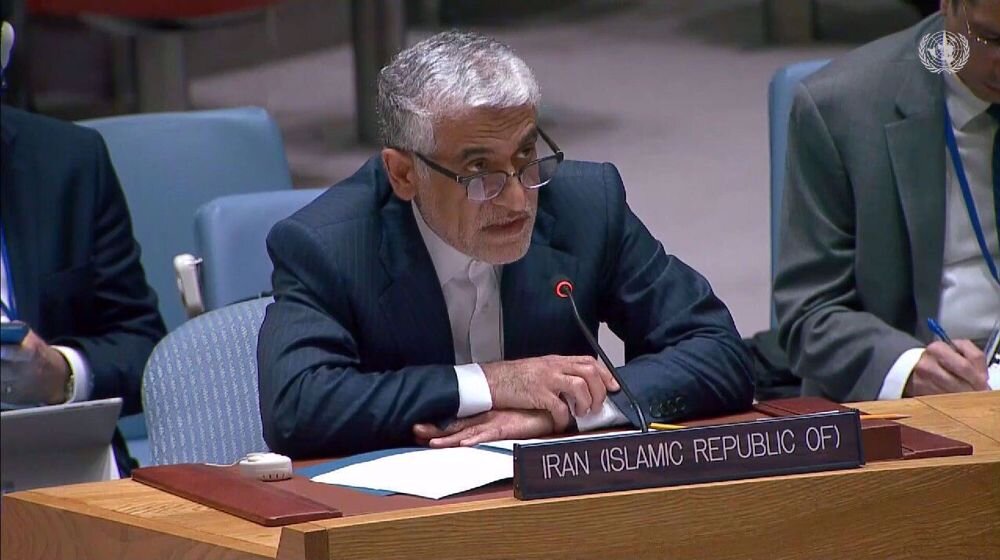Iranian diplomat calls for unconditional release of Afghan frozen assets

TEHRAN- The elimination of restrictions and "unconditional" release of billions of dollars in frozen cash from the Afghan central bank have been demanded by Iran's ambassador to the UN in order to help the war-torn nation cope with its escalating economic and humanitarian crises.
In his remarks to the United Nations Security Council (UNSC) on Tuesday, Amir Saeed Iravani described the present state of affairs in Afghanistan as unstable and perilous despite the UN's attempts to stabilize the situations.
He cited the report issued by UN Secretary-General António Guterres on the situation in Afghanistan and its effects on global peace and security, asserting that it indicates that 28.3 million Afghans would require humanitarian assistance in the upcoming year. This is despite the fact that the number was estimated at 24.4 million at the start of the previous year and was 24.4 million in 2022.
According to Iravani, the report also demonstrates that the Afghan government has not kept its promises, particularly those related to the establishment of an inclusive and elected government.
He stated that based on the report of the Secretary-General, Taliban have already put forward some constructive initiatives, particularly those targeted at combating corruption, which can serve as the foundation for a stable economic environment and its resurrection in the future years.
Iran's top diplomat to the UN went on to say that while humanitarian assistance is critical for Afghanistan, it is not a long-term solution, and the country's economy should be prioritized.
In light of other crises and wars, Iravani believes the humanitarian catastrophe in Afghanistan should not be disregarded.
“As we have emphasized many times, frozen Afghan assets belong to the nation and must be released unconditionally in order to help Afghanistan's economy,” he underscored.
He furthered, “Unfortunately, the United States turns to fictitious and unfounded justifications to support its illegal actions, including the continued freezing of Afghan funds, which is essential for the recovery of the nation's economy, rather than taking responsibility for its irresponsible withdrawal from Afghanistan. Sanctions regimes shouldn't obstruct efforts to revive the economy.”
He stated that Iran favors the United Nations Assistance Mission in Afghanistan (UNAMA) and its contacts and engagements with the Taliban in order to assist the Afghan people, particularly in terms of strengthening humanitarian responses and attempts to address economic difficulties.
"As a neighboring nation, the Islamic Republic of Iran has employed its skills and capacities to assist the Afghan people in overcoming their challenges," Iravani said.
He pointed out, “We have stated time and again that Iran and other neighboring states should not take on the full responsibility of taking in Afghan refugees. Based on the principle of shared responsibility, other countries, especially countries that claim to be advocates of Afghans’ human rights, especially women and girls, should accept refugees.”
Iravani added the existence of groups linked to Daesh and Al-Qaeda poses major dangers to the peace and security in Afghanistan, its neighbors, and the whole region.
He emphasized that Afghanistan’s status quo can form shaky circumstances, jeopardizing the region in which extremists, terrorists, and drug traffickers will be able to either attack vulnerable people or recruit them to promote terrorist objectives.
He also identified the Afghan opium trade as another significant issue.
The U.S.-led coalition forces fled Afghanistan in a disorganized and humiliating manner, giving rise to the Taliban in the wake of two decades of military adventure.
As fatal blasts and terrorist attacks against people continue to be a regular occurrence of everyday life in the aftermath of the Taliban's return to power, the group has mostly failed to deliver stability. The majority of terrorist attacks have been blamed on Daesh.
Since the Taliban gained power, the international community's refusal to recognize them, along with sanctions put on the central bank and the freezing of Afghan assets, has pushed the economy to the verge of collapse.
Leave a Comment